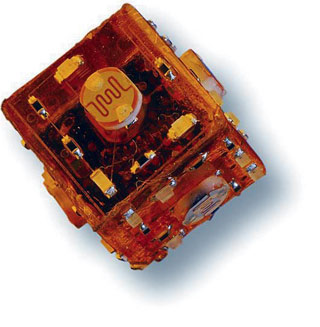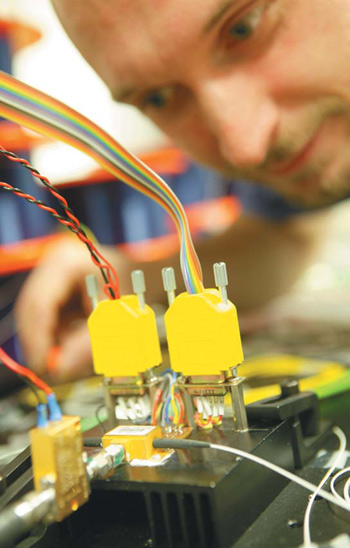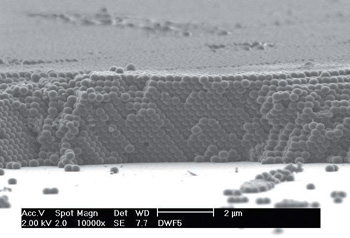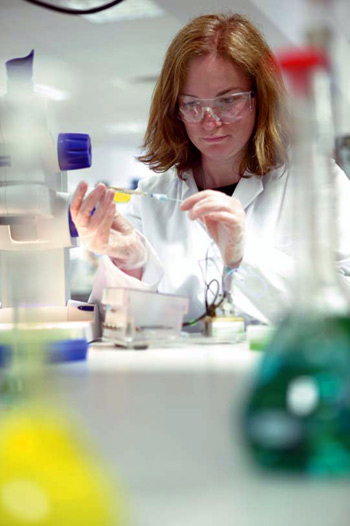| 2005 |

|
YEAR BOOK |
The Tyndall National Institute
|
The Tyndall National Institute
|

Introduction:
The Tyndall National Institute was established to build on the recognised strengths and complementary research activities of the NMRC, University College Cork (UCC) and the Cork Institute of Technology (CIT) in the area of Information and Communications Technology (ICT). Named after John Tyndall, the 19th century Irish scientist, entrepreneur and educator, the Institute brings together some 300 research scientists, engineers and students to create the largest ICT research centre in Ireland with extensive research facilities for the benefit of Irish industry and academia.
The vision for Tyndall is to focus on getting value from research that will impact Ireland's future economy and society. To achieve this, the Institute will focus on research excellence; partner with and support Irish industry; support other academic bodies in Ireland by offering access to research facilities; encourage and support international partnerships and contribute to education and outreach to the broader Irish population.
Major research activities within the Institute are focused on opportunities in photonics, electronics and ICT for Life Sciences. Programmes cover the spectrum from theoretical research and modelling through device fabrication and systems research. The Institute is located at the UCC Lee Maltings site, which will be substantially redeveloped over the next few years with the site expected to eventually contain over 15,000 m 2 of high quality research and support space, fabrication facilities, multi-user laboratories and industrial research space.

Research Excellence:
In electronics research, the emerging field of 'ambient intelligence' or 'smart environments', based on networks of autonomous sensors capable of wireless communication, will be a key driver for future applications in e-health, remote environmental monitoring, building management and personal security. With partners in the Department of Computer Science, UCC and the Adaptive Wireless Systems Group in CIT, hardware and software platforms are being developed that address the sensing, data processing, communications and power requirements of these wireless sensor networks as well as data and network management. A key focus has been the development of miniaturised wireless microsensor modules that are referred to as "intelligent seeds".
Tyndall has a world-leading capability in photonics with individual Tyndall researchers counted amongst the world's leading researchers in the field, having made pioneering contributions to the development of high-speed optical communication systems, photonics information processing and highly-secure systems using quantum cryptography. A number of devices developed at Tyndall are currently in commercial production � including high performance lasers and a Resonant-Cavity Light-Emitting Diode (RCLED) operating in the red spectral range. The latter is used to power in-car video entertainment systems operating over POF (plastic optical fibre), which a major European car manufacturer is installing in its latest models.

The principle of self-assembly of material systems underpins many of the structures that are under investigation at Tyndall, including dimension-controlled structures such as quantum dots, nanorods, nanowires, nanotubes and photonic band gap systems based on synthetic opals. Tyndall has developed methods whereby these materials may be synthesised, assembled and characterised with the high levels of reproducibility that are a fundamental requirement for the integration of these materials into future large-scale device production.
Tyndall's theory & simulation research is strongly linked to downstream developments in the design and fabrication of components and assemblies. It ranges from the atomic scale to the systems level, and encompasses activities in materials theory; photonics theory; device design; understanding the thermal and thermomechanical properties of components; and the development of powerful software tools that underpin the design of novel components.

National Access Programme:
The National Access Programme (NAP) was launched by Science Foundation Ireland (SFI) in November 2004 with the objective of having a catalytic effect on technology-driven innovation and collaboration in the third-level sector in Ireland. NAP provides funded access to Tyndall's research infrastructure (valued at over �120million) for all researchers in the Universities and Institutes of Technology in Ireland. SFI has invested �2m to give researchers around Ireland access to Tyndall's equipment and expertise, to provide for training on Tyndall's equipment and to fund project consumables and researchers' travel and living expenses.
A dedicated NAP team manages the programme at Tyndall and reports to an independent steering committee, chaired by Prof. Brian McCraith, DCU, and composed of academics from the Irish Universities and Institutes of Technology.
By the mid-point of the first year of the project, more than 50 proposals have been received bringing significant benefit to researchers across Ireland (CIT, DCU, IT Tallaght, NUI Galway, NUI Maynooth, TCD, Tyndall, UCC, UCD, UL & WIT). There have been thirty-four projects approved, ranging in size from a few days access to research equipment/facilities to large-scale projects focussed on the development of processes for the fabrication of semiconductor devices. The larger projects typically require considerable interaction between the Tyndall and external researchers.
Feedback to date suggests that NAP will not only be extremely beneficial to Irish researchers from a facilities perspective but will also act as a focus for technology innovation and collaboration between the Universities and Institutes of Technology throughout the country.

Conclusion
Tyndall will create a truly national ICT Institute that will be recognized for its technical excellence and its effective partnerships with industry and academia. It will focus on rapid exploitation of new ideas and will pursue new opportunities in areas of strategic importance to Ireland.
For general enquiries contact: Dr. Cian � Math�na,
E-mail: [email protected] ; Web: www.tyndall.ie ; For NAP enquiries contact: Paul Roseingrave, NAP Coordinator,
E-mail: [email protected] ; Web: www.tyndall.ie/nap